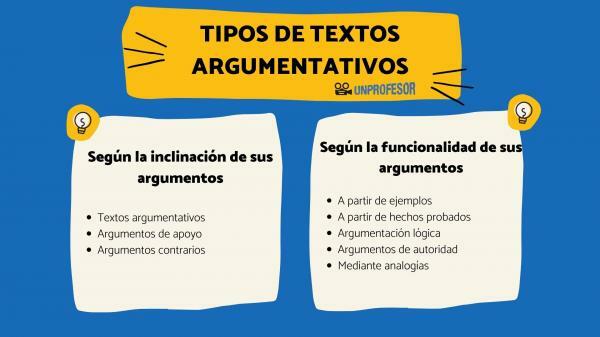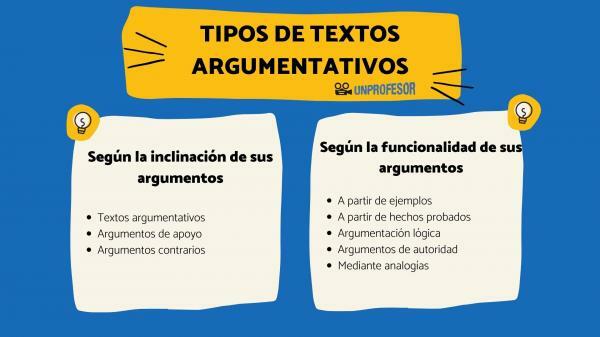ARGUMENTATIVE text types

Offer arguments seeks to convince an interlocutor, in this way we will get him to identify with our ideas and make them his own. The texts that do have this purpose are the argumentative texts. These have their own characteristics and structures, but in this lesson from a TEACHER we are going to focus on the types of argumentative texts that exist.
Index
- What are argumentative texts
- Types of argumentative texts
- Argumentative texts according to the inclination of their arguments
- Types of argumentative texts according to the functionality of their arguments
What are argumentative texts.
Although we are going to focus on the types of argumentative texts that exist, it never hurts to know the definition of them. Thus, we can say that argumentative texts are those that seek defend a specific idea using our own tools. They can be used in different fields and are generally used to express opinions, positions and specific ideas on any subject. These texts They can appear orally or in writing, always trying to convince the interlocutor based on arguments.
We must bear in mind that argumentative texts are created around a main idea defined or to a certain position that must be clearly stated so that the interlocutor understands and identifies with it.
Characteristics of argumentative texts
Next we are going to see a series of characteristics that all argumentative texts have in order to learn to identify them:
- Looking for convince the reader of a certain idea or position
- They are built following a objective point of view
- They use the first person singular
- Impartiality
- Main idea well defined
Types of argumentative texts.
Now that we know what they are and what their main characteristics are, we can focus on the types of argumentative texts that we can find. As we have already advanced, these can be found in any field and always have to do with the ideas and opinions of the author of the same. Thus, we can say that argumentative texts can be classified as follows:
- Attending to the inclination of their arguments
- Attending to the functionality of their arguments
Argumentative texts according to the inclination of their arguments.
Within the argumentative texts that attend to the inclination of their arguments, we can find different types that we will define below:
- Supporting arguments: this type of texts use arguments designed to define the main thesis of the same. Repetitions or redundancies are used to support the main idea. It is used mainly in scientific texts in which the author introduces quotes or examples from other authors that agree with his premises.
- Counter arguments: to ensure that his main idea is reinforced and reaffirmed, the author decides to use arguments opposed to it. That is, it will include citations or examples of other authors against your thesis in order to dismantle the hypotheses of other authors in favor of yours.

Types of argumentative texts according to the functionality of their arguments.
We can find argumentative texts in which the author attends to the functionality of his arguments. In these cases we will find the following types:
- From examples: the thesis or main idea is defended through examples, this helps the reader to better assimilate the arguments and be convinced of them. It is a very effective way to achieve effective communication.
- From proven facts: the author relies on data, statistics or percentages from studies in order to strengthen the main idea of the text. The information offered is objective and helps to convince the reader, which is why it is one of the most widely used types of argumentative texts.
- Logical argumentation: the arguments are based on the basic principles of logic such as the law of cause and effect, syllogisms, conclusions... etc. All this seeks to refute the main thesis of the text. On many occasions these texts include the premises in an implicit way for the reader to find out.
- Arguments from authority: They are based on the inclusion of quotes or opinions of experts in the field. This gives credibility to the text in question and thereby supports its initial thesis.
- By analogies: argumentative texts can use analogies or similarities in order to connect two realities. This helps the reader to better understand the text and therefore identify with the idea that is being defended in it.
These are the different types of argumentative texts that we can find in Spanish. They are widely used in any field since you can find them related to science, politics, economics and a long etcetera of topics. Understanding their characteristics and their types will help you identify them and know how to use them in a simple way. If you want to continue discovering more lessons like this and increase your knowledge, we encourage you to visit our section on Spanish language in which you will find other content of your interest.
If you want to read more articles similar to Types of argumentative texts, we recommend that you enter our category of Writing.



